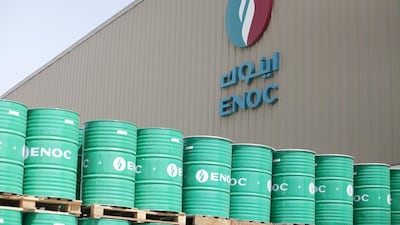Emirates National Oil Company (Enoc) is set to award the contract for a major expansion of its Jebel Ali plant, part of a broader downstream growth strategy that it expects will create hundreds of new jobs.
The plans for the refinery expansion and the addition of more than 80 new retail outlets in the UAE and Saudi Arabia are part of Enoc’s efforts to develop into a “middleweight” integrated oil player, following the doubling of its upstream output last year when it purchased the 46 per cent of Dragon Oil it did not already own.
The refinery contract is expected to be valued at just under US$1 billion with a mandate to build three main and several support units at Enoc’s refining complex, according to an Enoc spokesman.
That expansion, which has been on the drawing board for several years, will increase capacity at the plant by 50 per cent, to 210,000 barrels per day, and add to its product range a number of fuels that meet European emissions standards.
Details of how many additional jobs will be added are expected when the tender winner is announced next month. Currently, Enoc employs a total of 9,000, of whom 146 are employed directly at the refinery, and about 2,000 work at the main Dragon Oil facility in Turkmenistan.
The cost of the project was originally expected to be higher, but bids were reduced by the oil price collapse over the past two years and deflation in the oil construction industry.
The final shortlist includes South Korea’s Samsung Engineering and Technip of France.
The Jebel Ali plant was originally built in 1999 and last upgraded in 2010, when an $850 million investment lifted capacity to 120,000 barrels per day from 70,000 bpd.
It is the smallest of the UAE’s four plants and its expansion follows the doubling of capacity at the Ruwais plant in Abu Dhabi last year to meet growing UAE and regional fuel demand.
The Jebel Ali plant processes condensate, a natural gas byproduct sourced from Qatar, Iran and elsewhere, and produces fuels for the local market as well as naphtha, a petrochemicals feedstock sold in Asia.
The new programme will result in three units being built – jet fuel and diesel hydrotreaters, an isomerisation unit (which raises fuel octane levels), and a crude distillation unit – which will allow production of high-octane petrol, low sulphur jet fuel and ultra-low sulphur diesel, all of which meet Euro V emissions standards.
Enoc has a linked tender still pending – expected also to be finalised in the next few months – for Project Falcon, a plan to link the Jebel Ali storage facilities via pipeline to Al Maktoum International Airport in Dubai South, about 60 kilometres away.
Enoc also is expanding its retail operations substantially and taking a new strategic approach following moves by regional governments to remove fuel subsidies.
In the UAE, Enoc plans to add 54 retail outlets over the next four years and is already refurbishing some of its existing 112 outlets.
Some will be simple fuel stops with easy access on busy thoroughfares, while others are adding Enoc’s food and beverage brand stores, Pronto, as well as its Auto Pro mechanic services.
Some will include full food court offerings with brands such as McDonald’s, as well as laundromats and other mini-mall outlets.
In Saudi Arabia, Enoc won a bid to build 27 service stations on link roads between the major cities.
In the spring, Saif Al Falasi, Enoc’s chief executive, said the company strategy includes looking to expand upstream. The integrated strategy would imply it wants to double upstream capacity again to about 200,000 bpd, to provide a natural hedge on margins between upstream and downstream.
amcauley@thenational.ae
Follow The National's Business section on Twitter

